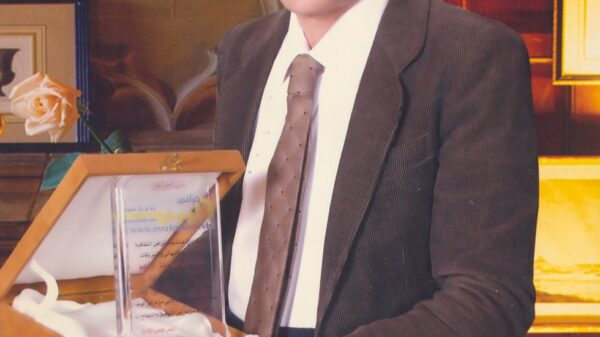


A PICTURE’S STORY
By: IBRAHIM KHALIL IBRAHIM
Translated into English by the Lebanese-Brazilian poet and translator TAGHRID BOU MERHI
حكاية صورة
بقلم : إبراهيم خليل إبراهيم
ترجمتها إلى الإنجليزية الشاعرة والمترجمة اللبنانية البرازيلية تغريد بو مرعي
يوم 31 أغسطس عام 2007 أعلنت مسابقة المرافىء الأدبية السعودية الدولية برئاسة المبدع صالح سعيد الهندي فوز الأديب إبراهيم خليل إبراهيم من جمهورية مصر العربية بجائزة فرع المقال وقالت لجنة المسابقة : المقال يتميز بسلامة اللغة ودقة التعبير وجدة الفكرة وعمق الرؤى والإبداع في بنية المقال وأسلوبه ويتناول قضية إنسانية عامة تتصل بحقيقة مفادها : أن الإرادة تقهر الصعاب وقد لجأ الكاتب الأستاذ إبراهيم خليل إبراهيم إلى الأسلوب العلمي المدعم بالمعلومات ليبرهن على هذه الحقيقة فقدم نماذج إنسانية لمعاقين تميزوا في مواهبهم ثم انتقل إلى مستوى الدول والشعوب بأسلوب مترابط جمع الأدبي والعلمي وهاهو المقال الفائز :
الإرادة تصنع المعجزات
بقلم : إبراهيم خليل إبراهيم
الأمل هو وقود الحياة والإرادة الحرة تصنع المعجزات فها هي هيلين كيلر التي قدمت للبشرية درسًا عمليًا في الأمل الذى قهر العجز والإرادة التي حولت اليأس إلى واقع ملموس فقد ولدت بولاية الاباما الأمريكية وقبل أن تكمل عامها الأول بدأت تمشي وتنطق ببعض الكلمات ولكن عندما بلغت الشهر التاسع عشر أصيبت بحمى أفقدتها البصر والسمع والكلام وكانت تدرك الأشياء باللمس والشم وعندما بلغت عامها الخامس أقبلت على التعليم بطريقة بريل وأظهرت تفوقًا مذهلًا ونبغت فى الجبر والهندسة واللغة الالمانية واللاتينية والأدب والكتابة وخلال دراستها الجامعية أصدرت كتابيها قصة حياتي والتفاؤل وأكدت على أن من يريد أن يحصل المعرفة الحقة ينبغي أن يتسلق الجبل وحده وفى مذكراتها قالت : لقد تعثرت مرارًا ووقعت لكني كنت أقف على الفور وأتخطى العقبات وهاهو ألبرت أينشتاين صاحب نظرية النسبية التي هزت العالم في شبابه تقدم إلى معهد ميونيخ الفني ولكن المعهد رفضه بحجة أنه لايبشر بالخير فاضطر للعمل كساع للبريد حتى يواصل دراسته لعلم الفيزياء الذي يعشقه حتى توصل لنظريته التي وضعته في سجل العلماء النابغين أما الموسيقار العالمي بيتهوفن فقد أصيب بالصمم ولكنه لم يتوقف أو ييأس بل واصل إبداعه وقدم موسيقاه التي مازالت تسعد العالم وإميل زولا فب تعليمه الأولي أعطاه مدرس الأدب الفرنسي صفرًا ولكن هذا الصفر لم يمنع تفوقه وواصل علمه وإبداعه إلى أن أصبح من أعظم أدباء فرنسا وأما رديارد كبلينج فى شبابه تقدم إلى إحدى الصحف الإنجليزية ليعمل محررًا ولكن رئيس تحرير تلك الصحيفة رفضه بحجة أنه لايجيد استخدام اللغة الإنجليزية ولكن رديارد فيما بعد حصل على جائزة نوبل في الأدب وعميد الأدب العربي الدكتور طه حسين فقد بصره وهو طفلًا ولكنه أصر على التعليم حتى أصبح أستاذًا في الجامعة ثم وزيرًا للتربية والتعليم بمصر وقدم للمكتبة العربية مجموعة من الكتب الخالدة وأكد على أن التعليم كالماء والهواء للناس .. كل الناس .. وفنان مصر والعالم العربي عبد الحليم حافظ كان ينزف الدم ولكنه ماغاب يومًا عن أداء دوره الفني والوطني وعاشت أغنياته حتى الآن خالدة خلود الزمن في وجدان الإنسانية .
هذا على مستوى الأفراد أما إذا نظرنا إلى تجارب الأمم والشعوب فسوف نجد اليابان مثالًا للعبقرية والتحدي فبعد معاناتها من ويلات القنبلة الذرية صممت على التقدم والأزدهار برغم أن الخبراء أكدوا على استحالة وجود اللون الأخضر على أرضها ولكن من لايقدر تقدم اليابان ونهضتها العظيمة ؟ وقبل كل هذا وذاك لنا في خير البرية محمد صلى الله عليه وسلم الأسوة الحسنة فقد رفض مغريات الحياة الدنيا لآداء رسالته وقال لعمه مقولته التي مازال صداها يرن فى سمع الزمان : ( والله ياعم لو وضعوا الشمس في يميني والقمر في يساري على أن أترك هذا الأمر ماتركته )
فيا صديقي: لاتقل أنا ضعيف فالإيمان هو الأمل .. لاتقل لامحالة فغدًا سوف تشرق الشمس من جديد .
A Picture’s Story
By: Ibrahim Khalil Ibrahim
Translated into English by the Lebanese-Brazilian poet and translator Taghrid Bou Merhi
On August 31, 2007, the Saudi International Literary Harbors Competition, headed by the creative Saleh Saeed Al-Hindi, announced that Egyptian writer Ibrahim Khalil Ibrahim had won the award in the essay category. The competition committee stated: “The essay is distinguished by the soundness of the language, the precision of expression, the originality of the idea, the depth of vision, and the creativity in both structure and style. It addresses a universal human issue rooted in the truth that willpower overcomes difficulties.”
The writer, Mr. Ibrahim Khalil Ibrahim, adopted a scientific approach supported by information to demonstrate this truth. He presented human examples of individuals with disabilities who excelled in their talents, then expanded to address nations and peoples with a coherent style blending the literary and scientific.
Here is the winning essay:
—
The Will Creates Miracles
By: Ibrahim Khalil Ibrahim
Hope is the fuel of life, and free will creates miracles.
Take Helen Keller, who gave humanity a practical lesson in hope that overcame disability, and in willpower that transformed despair into tangible reality. She was born in the state of Alabama, USA. Before her first birthday, she began to walk and utter a few words. However, at the age of nineteen months, she was struck by a fever that left her blind, deaf, and mute. She perceived the world through touch and smell.
By the age of five, she began learning through the Braille system and showed astonishing brilliance. She excelled in algebra, geometry, German, Latin, literature, and writing. While still in college, she published two books: The Story of My Life and Optimism. She emphasized that true knowledge requires one to climb the mountain alone. In her memoirs, she wrote: “I stumbled many times and fell, but I always got up and overcame the obstacles.”
Then there’s Albert Einstein, the man behind the theory of relativity that shook the world. As a young man, he applied to the Munich Institute of Technology, but the institute rejected him, claiming he showed no promise. He had to work as a mail carrier to continue his studies in physics, which he loved passionately. Eventually, he developed his theory that placed him among the greatest scientists in history.
And what about the legendary composer Beethoven? He lost his hearing, but he never stopped or gave in to despair. Instead, he continued his creative journey and composed music that still brings joy to the world today.
In his early education, Émile Zola received a zero in French literature from his teacher. But that “zero” did not prevent his progress. He continued to learn and create until he became one of the greatest writers of France.
Rudyard Kipling, in his youth, applied to work as an editor at an English newspaper, but the editor-in-chief rejected him, claiming he did not master the English language. Nevertheless, Kipling later won the Nobel Prize in Literature.
As for the Dean of Arabic Literature, Dr. Taha Hussein, he lost his sight as a child. Yet he insisted on continuing his education until he became a university professor and eventually Egypt’s Minister of Education. He enriched the Arab library with immortal books and firmly believed that education is like water and air—essential for all people.
The Egyptian and Arab world singer Abdel Halim Hafez used to suffer from internal bleeding, yet he never once missed fulfilling his artistic or patriotic duties. His songs have remained timeless in the consciousness of humanity.
That’s on the level of individuals. But when we look at the experiences of nations and peoples, Japan offers a remarkable example of genius and perseverance. After enduring the devastation of the atomic bomb, Japan resolved to progress and prosper. Experts had predicted that no greenery would grow again on its land. Yet who today can deny Japan’s advancement and greatness?
Above all, we have in the Prophet Muhammad (peace be upon him) the finest role model. He refused the temptations of worldly life to carry out his divine message. He famously told his uncle: “By God, O uncle, if they were to place the sun in my right hand and the moon in my left to abandon this mission, I would not abandon it.”
So, my friend:
Do not say, “I am weak,” for faith is hope.
Do not say, “It is impossible,” for tomorrow the sun will rise again.